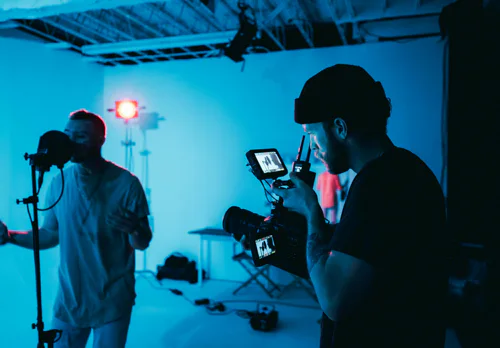Invisible heroes of the show world
Without the crew, musicals such as "Cats" or "Dance of the Vampires", theater productions, films and TV contributions as well as show events could not take place. Whether make-up artists, event technicians, tailors, cameramen, set builders or stage managers, they are all the stars behind the stage or the camera.
They are not visible to the audience as they move imperceptibly in the background, but they are directly involved in the action and right in the middle of it. Unlike artists, most crew members are often employed by the same employer on a permanent basis or for at least one season. Their salary is decent and can be improved considerably through their own initiatives, such as further training and certificates.
What do crew members do?
As soon as the performers step onto the stage, in front of the audience or play their scenes in front of the camera, part of the crew members' work is already done: the preparation. Actors have to be made up, coiffed, dressed and wired, the technology has to be ready for use and the scenery has to be in place. From lighting, sound and stage technicians, make-up artists to costume tailors, dressers, painters, prop masters, cameramen and stage managers, everyone pitches in.
Finally, the show can begin. During the performances or film and television recordings, the crew is on hand to keep the show running. Make-up artists, for example, glue false beard hair back on, lighting technicians follow the performers with spotlights, sound technicians control the use of music, stage technicians are responsible for rebuilding the scenery and set and stage managers make sure that the artists don't miss their cues.
This is why the crew members who are involved in live productions are also known as the "running crew". With their help, wonderful productions are created that immerse the audience in another world. Camera operators have the task of capturing the most important scenes and presenting them in an entertaining way for the audience.
Industries in which crew members find employment:
Film, television and radio
Theater, musicals and opera
Advertising and web
Show events
Who hires crew members?
Crew members find jobs:
at film and television studios
at radio stations
at production companies
at theaters, also multi-genre theaters including (spoken/music) theater, musicals and opera
with event agencies
at specialist companies
When looking for a job, crew members mainly find support on online job exchanges and portals that specialize in the artistic sector. Employers publish their vacancies on these sites. Being able to view various jobs in one place is practical and saves time.
What skills do crew members have?
In addition to special technical skills, crew members have creativity and, in most areas, manual dexterity. They are also excellent team players and have a knack for dealing sensitively with artists. In addition, the unusual working hours at weekends and on public holidays are no problem for them, they are stress-resistant and physically resilient.
You can find out what qualities prospective crew members should have in the following article: How do you become a crew member?
Is training necessary?
Crew members usually learn their trade during a three-year apprenticeship. As an apprentice employed by a company, they work in the company's day-to-day business and also attend a vocational school where they are taught theoretical knowledge. As a trained journeyman, they can also attend a master school and gain further qualifications, for example as part of a degree course.
Some professions also allow newcomers to complete a full-time or dual course of study from the outset. Both training and studying have their advantages and disadvantages. Which path you ultimately choose is up to you.
However, one thing is certain: a completed apprenticeship with a certificate is mandatory.
You can find examples of the requirements for different professions and the structure of an apprenticeship in this article "How to become a crew member".
What entry opportunities does a crew member have?
Crew members are sought-after people, because without them, no movie can be made, no TV show can be recorded and no concert can be played. They ensure that the spotlight as such exists at all.
The bad news, however, is that turnover is relatively low, as theaters and other employers hire crews for the long term. With an internship in different theaters or in the same one, you could manage to get your foot in the door and increase your job chances through contacts and good references.
How much does a crew member earn?
First and foremost, the salary depends on whether the company that normally employs crew members on a permanent basis is bound by collective agreements or not. In this case, we assume that there is a collective bargaining obligation.
However, collective agreements may differ depending on the industry or federal state. There are also differences in professional experience: is the employee still in training, is he a journeyman and how many years of experience does he have? The place of work and the size of the company also play a major role.
Starting salaries in the first year of training begin at around EUR 500, in the second year it is around EUR 600 to 900 and in the third year up to EUR 950. Once you have completed your training, salaries rise rapidly. You can expect a monthly salary of at least EUR 2,000 gross.
With an additional educational title (e.g. bachelor's, master's), you are not only indispensable for the employer, but automatically move into a higher salary bracket. Salaries from EUR 3,000 gross per month are then no longer a rarity, for example as a specialist in event technology.























